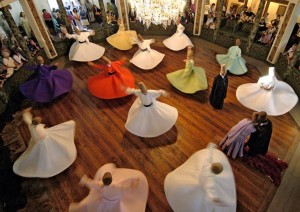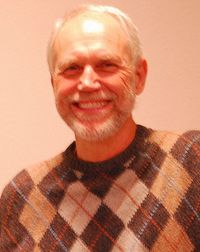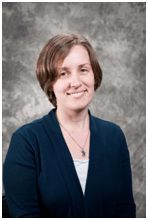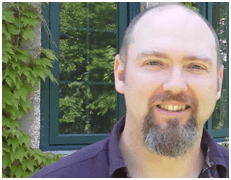In the academic study of ‘religion’, an organization that is at the forefront of encouraging interdisciplinary dialogue is the Grace Davie and Jay Demerath – were recorded at the SSSR Annual Meeting back in 2011. While SSSR was originally dominated by the field of sociology, there has been a recent shift in attendees toward other disciplines such as psychology, education, religious studies, nursing and others that share an interest in understanding ‘religion’ and ‘spirituality’ from their respective perspectives. The diversity of presenters is only matched by the diversity of paper topics presented. While SSSR is typically hosted in an US city, SSSR has gained popularity as an international conference as well with the 2014 Annual Meeting hosting the largest number of international scholars to date.
Considering these observations, the RSP collaborated with SSSR at the 2014 Annual Meeting in Indianapolis, Indiana to offer an interdisciplinary panel on the study of religion. Each of the papers presented are not only from different fields in the study of religion but also methodologically or theoretically apply an interdisciplinary approach. The authors represent the best in their fields. Some are established scholars with a body of work while others are up-and-coming talent. We hope you enjoy the RSP sponsored panel on an interdisciplinary approach to the study of religion. See below for the abstracts of the papers presented.
Many thanks to Chris SIlver, Tommy Coleman, and all at the SSSR for making this recording possible. This panel recording is somewhat different from our usual weekly podcast – if you enjoyed this, why not check out the podcast, or subscribe on iTunes? And remember, you can use our Amazon.co.uk, Amazon.com, or Amazon.ca links to support us at no additional cost buying academic texts, knitting needles, Alien Ant Farms, and more.
The Religious Studies Project Panel on Religious Experience: Understanding and Explaining
[youtube https://www.youtube.com/watch?v=QJp5DiV3WKc&feature=youtu.be]
Convener: Christopher Silver
W. Paul Williamson, Poison-Drinking in Obedience to the Faith: A Phenomenological Study of the Experience
Christian serpent handlers of American Appalachia are most noted for handling venomous snakes in obedience to one of five perceived mandates of Christ in Mark 16:17-18: Casting out devils, speaking new tongues, taking up serpents, drinking poison, and laying on hands for healing. Over the past two decades, I have studied several phenomena among this compelling group including their sermons, their music, the anointing, near-death serpent bites, community support (Williamson & Hood, in press), and of course serpent handling (see Hood & Williamson, 2008, for summaries of the above uncited studies). The sign of drinking poison, however, has been largely ignored. To address this neglect, I conducted phenomenological interviews with nine serpent handlers who have practiced poison-drinking. Based on a hermeneutic analysis of these interviews, this paper presents a pattern of themes that describe the structure of meaning in the experience of drinking poison in obedience to the faith.
April Stace Vega, “That’s a Really Real Feeling”: Popular Music and the Sacralization of the Self in Evangelical Worship
“Should Churches Play ‘Highway to Hell’ in order to Reach Unbelievers?” This question is posed on a website catering to evangelical pastors with a link to a video. In the video, several prominent pastors discuss the use of the song (by rock band AC/DC) at a recent Easter morning service. It considered a controversial music choice due to the lyrics of the song and the persona that the band projects, but is also considered a useful tool for evangelism. This project is an ethnographic study on the use of music with no overtly religious lyrics in what sociologist Donald Miller terms “new paradigm” churches in the Washington, D.C. area. I view the use of popular-secular music through the lens of the subjectivization thesis of Paul Heelas and Linda Woodhead. In this paper, I focus on one particular meaning ascribed to popular-secular music in these churches: the ability of the music to express “real feeling” in a way traditional sacred music does not.
Tatsushi Hirono, Corroborative Efforts between Social Workers and Religious Leaders in Natural Disaster Relief: A Comparative Analysis among the USA, Philippines and Japan
The United States of America, the Philippines, and Japan, have suffered multiple natural disasters: Typhoon in Philippines (2013), Hurricanes Sandy (2012) and Katrina (2005) in the USA, and the 8.9 Magnitude earthquake (2011) in Japan. Immediately after these natural disasters, victims needed shelter, water, food, and blankets. However, a few weeks after, they needed mental health support. The investigator hypothesizes that religion would reduce the natural disaster victims’ PTSD symptoms and increase their “hope.” He sent 1,500 mailing surveys to Christian and Buddhist clergy in the New Orleans, New York, Manila, Tacloban, Tokyo, and Fukushima areas. He found that cultural differences between Christian and Buddhist religious communities: (a) More Christian clergy thought natural disaster relief efforts are their obligation. (b) Christian clergy focus more on “comfort”, “reducing pain,” and “hope,” while Buddhist clergy focus more on “listening” and “praying” when they talk with family members who lost their loved ones.
Benjamin Bennett-Carpenter, Against Silver Bullet Explanations for Religion: Toward Interdisciplinary Conversations that Allow for Both Consilience and Divergence
Single explanations of religion from within one particular discipline are partial explanations and do not suffice by themselves. As an enterprise, the scientific study of religion will do well to continue to foster conversations across disciplinary boundaries in an overall team effort, moving, on the one hand, toward increased consilience, or a ‘unity of knowledge’ (E.O. Wilson 1998), while also allowing, on the other hand, plenty of freedom for divergence. This presentation briefly highlights key contributions from disciplines such as biology (e.g., Ridley 2004; Feierman 2009), evolutionary anthropology and cognitive psychology (e.g., Barkow, Cosmides, Tooby 1992; Boyer 2001; Atran 2002; Barrett 2004), evolutionary-oriented sociology (e.g., D.S. Wilson 2002; Diamond 2012), and semiotic-oriented communication studies (e.g., Baudrillard 1988; Raschke 2012; Bennett-Carpenter 2014) as touch-points for conversation that move toward consilience, while at the same time remaining open to divergence.









